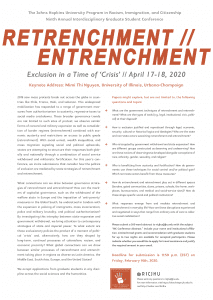
Ninth Annual Interdisciplinary Graduate Student Conference
Retrenchment // Entrenchment: Exclusion in a Time of ‘Crisis’
April 17-18, 2020, Baltimore, MD
2019 saw mass protests break out across the globe in countries like Chile, France, Haiti, and Lebanon. This widespread mobilization has responded to a range of government measures from authoritarianism to austerity, regressive taxes to social media crackdowns. These broader governance trends are not limited to such sites of protest; we observe similar forms of carceral and military expansion as well as consolidation of border regimes (entrenchment) combined with economic austerity and restrictions on access to public goods (retrenchment). With social unrest, wealth inequalities, and mass migration signaling social and political upheavals, states are attempting to structure their responses both globally and nationally through a combination of social service withdrawal and militaristic fortification. For this year’s conference, we invite submissions that consider how the politics of exclusion are mediated by state strategies of retrenchment and entrenchment.
What connections can we draw between governance strategies of retrenchment and entrenchment? How can the markers of capitalist governance, such as the withdrawal of the welfare state in Europe and the imposition of ‘anti-poverty’ measures in the Global South, be understood in tandem with the expansion in policing of immigrants, mass incarceration, police and military brutality, and political authoritarianism? By investigating this interplay between state expansion and government withdrawal, we bring attention to contemporary strategies of state and imperial power. To what extent are these exclusionary policies the product of a moment of political ‘crisis’ and, alternatively, how are they shaped by long-term, continual processes of colonialism, racism, and economic precarity? What global connections can we draw between similar processes of retrenchment and entrenchment taking place in regions as diverse as Latin America, the Middle East, South Asia, Europe, and the United States?
Keynote Address
Mimi Thi Nguyen, Associate Professor, University of Illinois, Urbana-Champaign

Mimi Thi Nguyen is Associate Professor of Gender and Women’s Studies at the University of Illinois, Urbana-Champaign. Her scholarship brings together questions of race, gender, resistance, aesthetics and capitalism.
Publications and Projects
Her first book, called The Gift of Freedom: War, Debt, and Other Refugee Passages, focuses on the promise of “giving” freedom concurrent and contingent with waging war. She develops a new understanding of American empire and how it produces new subjects and actions, such as the grateful refugee or enduring war.
Her following project is called The Promise of Beauty. Here she examines the role of beauty and how it appeals or appears to appeal to observers and pushes them to want to protect and extent the life of the beautiful and what intuitions and institutions facilitate the promise of beauty alongside occasions of violence.
Other Work and Awards
She is also co-editor with Fiona I.B. Ngo and Mariam Lam of a special issue of positions on Southeast Asian American Studies and co-editor with Thuy Linh Nguyen Tu of Alien Encounters: Pop Culture in Asian America. She has published in Signs, Camera Obscura, Women & Performance, positions, Artforum, The Funambulist, and Radical History Review. Nguyen was named a Conrad Humanities Scholar in 2013, a designation supporting the work of outstanding associate professors in the humanities within the College of Liberal Arts and Sciences at the University of Illinois. She was named a John and Grace A. Nicholson Scholar in 2017, a designation supporting excellence in philosophical inquiry, also at the University of Illinois.
Nguyen has made zines since 1991, including Slander (formerly known by other titles) and the compilation zine Race Riot. She is a former Punk Planet columnist and Maximumrocknrollvolunteer. She is also co-author of the retired research blog on dress and beauty threadbared.
Applications
We accept applications from graduate students in any discipline across the social sciences and the humanities.
Papers might explore, but are not limited to, the following questions and topics:
- What are the government techniques of retrenchment and entrenchment? What are the types of tools (e.g., legal, institutional, civic, political) at their disposal?
- How is exclusion justified and reproduced through legal, economic, security, cultural or historical logics and ideologies? Who are the state and non-state actors sustaining retrenchment and entrenchment?
- Who is targeted by government withdrawal and state expansion? How are different groups constructed as deserving and undeserving? How are these notions of deservingness developed alongside conceptions of race, ethnicity, gender, sexuality, and religion?
- Who is benefiting from austerity and fortification? How do governments use these techniques for social control and/or political gain? Which non-state actors benefit from these measures?
- How do entrenchment and retrenchment play out in different spaces (borders, gated communities, slums, prisons, schools, the home, workplaces, bureaucracies, and medical and social-service sites)? How do these shape specific social and political institutions?
- What responses emerge from and mediate retrenchment and entrenchment in everyday life? How are these disruptions experienced and negotiated in ways that range from ordinary acts of care to collective social mobilization?
Please submit a 300 word abstract to [email protected] with the subject “RIC Conference Abstract.” Include your name and institutional affiliation.
Limited travel grants and accommodation with graduate students for up to two nights are available for accepted participants. Please indicate whether you would like to apply for travel assistance and justify the required amount in your email.
Deadline for submission is 11:59 p.m. (EST) on Friday, February 14th, 2020.
For more information, please visit our website or follow us on Twitter and Facebook.
